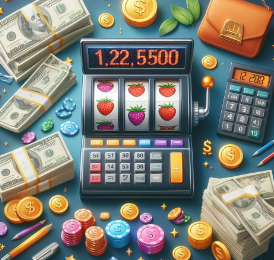Slot machines utilize sophisticated mathematical models and random number generation to create an entertaining gaming experience with unpredictable outcomes. At first glance, slots may seem like mindless games of pure chance. However, under the flashy graphics and sounds lies an intricate foundation of math-based algorithms and carefully calculated odds.
Understanding slot machine functionality's data-driven nature provides insight into game design and optimal play strategy. Whether you aspire to improve your slot machine gaming results or have an intellectual curiosity about the inner workings, delving into the numbers behind the scenes is vital.
In this exhaustive manual, we will explore the integral role that mathematical theory plays across all aspects of slot machine engineering and gameplay:

Responsible for the very lifeblood of slot machine randomness, Random Number Generators (RNGs) ensure fair and unpredictable outcomes. RNGs consist of complex mathematical algorithms running within the game software to produce an endless sequence of numerical values.
While software RNGs were introduced in the 1960s, regulations and technology upgrades moved slots from mechanical reels and pull handles to the fully digital experiences every day today. Let's explore the key components enabling those entertaining graphical spins:
At the heart lies the specific random number generation algorithm implemented in the software. Common examples include Linear Congruential Generators and the Mersenne Twister. These apply mathematical functions on seed numbers to produce seemingly patternless outputs at incredible scale and speed.
Key traits of quality algorithms:
Meanwhile, RNG formulas create data spread evenly across number ranges, seed numbers, and entropy, which introduces unpredictability. Seeds are the initializing values, and entropy represents unknown variables.
Sources of entropy might include:
The raw random numbers get mapped to predefined symbol sets on virtual reels with weighted outputs. Specific stops get higher weightings, thereby occurring more frequently. This aligns the randomness to actual game payout percentages.

Building upon the raw outputs from RNGs, game developers apply additional mathematical modeling to align with regulatory standards and create an entertaining gaming balance.
While RNGs generate initial randomness, odds calculations map those to actual winning and losing outcomes. The payout ratios determine game profitability.
Key metrics calculated during game design:
Regulations require minimum RTPs with typical ranges:
Volatility indicates the potential variance in payouts in the short term. Low volatility slots provide smaller, more consistent wins versus higher volatility with bigger, sporadic payouts.
Standard deviation quantifies volatility on a scale - the higher the value, the wider the variance. Players manage bankrolls accordingly.
Also called reel strip settings, par sheets map the precise number of stops on virtual reels to actual cash payouts down to granular detail. Regulators vet the par sheets.
While RNGs, volatility, and par sheets represent what happens behind the graphical spins, player actions contribute to results, too. You can utilize slot math insights to optimize decisions.
The pay table lists symbol payouts - study it closely rather than just hitting spin! Check:
Maximizing your slot knowledge maximizes potential returns over time through better betting.

Since higher volatility slots swing up and down sharply in the short run, budget wisely and avoid emptying accounts chasing big spins; steady, measured play aligns bankroll to variance.
While winning combinations contain an element of chance, RTP rates provide estimated payouts over many spins. Have reasonable expectations - slots are entertainment.
You can only partially overcome the house advantage inherent in the math. However, understanding slot engineering and strategies within the bankroll helps tip odds slightly positively.
In summary, while an individual spin relies on the momentary randomness from RNGs, slot machine outcomes conform to statistical norms inherent in the mathematical models powering game parameters, volatility levels, and payout tables.
Rather than resigning altogether to chance, you can leverage the slot machine mechanics to polish gameplay. Grasp the numbers defining each title to outfit bankrolls properly, pinpoint bonus triggering opportunities, and evaluate where house edges prove friendliest.
Slot machines represent marvels of mathematical innovation - the stats-driven engines humming behind the flashy sights and sounds seamlessly combine randomness, regulated fairness, and deep gameplay.
RNGs spawn endless numerical values fed through intricately configured algorithms to determine everything from imagery on the reels to variance rates in payouts. Mathematics enables manufacturers and regulators to shape products conforming to standards while allowing for distinct experiences.
For players, spotting slots ruled by the mathematical trait you most fancy - whether volatility potential, bonus features, or max jackpots - leads to more enjoyment. Budgeting bankrolls based on understanding the math-derived payback percentages and fluctuation ranges grooms strategy.
So, while historical connotations evoke images of mechanical one-armed bandits relying purely on blind luck, modern slot titles form intricate simulations with extensive mathematical foundations. The numbers add up to power popular games.
Probing the probabilities, statistics, and random variables underlying each title allows you to appreciate slot engines better. Glimpsing the digital heartbeat provides intellectual excitement, combining the thrill of slots with numerical elegance!
Your guide to the best pokie games. Latest Pokie Tournaments, Jackpots and Promotions.